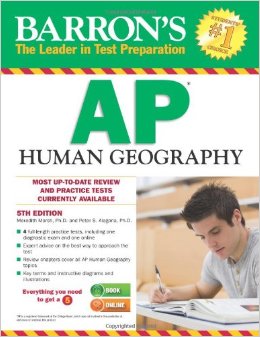AP Human Geography: A Guide to Success in the Course and the Exam
A Guide to Getting a 5 on the AP Test
AP Human Geography (or APHuG, as students often call it) is a useful introductory AP course that provides a challenge for many high school students. While it can be a very rewarding course, it also requires a lot of hard work, which is daunting to some students. To fix this, I have compiled a list of helpful tips that should make that elusive 5 much more attainable.
Actually Read the Textbook
Your textbooks will be one of your most accessible and useful resources while taking this course. It provides most of what will be covered on the AP Test and will be much easier to access and find than many other outside resources will be. It is also probably what your in-class tests will be based off, so actually reading the textbook will be helpful in that sense too.
And what do I mean by “actually” read the textbook? I mean that you should do more than just merely skim over the chapters. Take time to thoroughly read the chapters, make flashcards on terms that are bold in the text, note the different graphics and maps (and trust me, there will be a lot of them), and study and understand them. If you start doing this at the beginning of the course, you will have the ideal preparation coming into the AP Test.

Use a Prep Book
This may sound obvious; however, it is essential to have and actually use a prep book in order to prepare yourself. The best thing to do would be to purchase a prep book at the beginning of the year and use it as you go. What I mean by that is, if you are learning about agriculture, along with reading your textbook’s agriculture chapter, also review the prep book’s agriculture section. Most textbooks do not include every little bit of information that will be on the AP Test. By reviewing the prep book along with the textbook, you will be filling in gaps in your knowledge, that way there will be less to actually review when tests roll out in May.
Some of you might be wondering: what prep book should I use? The one that I personally found to be the most useful, and many of my classmates found to be helpful as well, was the Princeton Review prep book. It was packed with a lot of information, which is why it is crucial to start reviewing early, and also had several practice tests with questions formed very similarly to the ones asked on the actual AP Test. The Barron’s prep book was a much more condensed book that was mainly useful for vocabulary review. Both of these books can be found on Amazon for fairly inexpensive. However, if you are unable to buy them, your local library should have AP prep books available for you or a former student may be willing to donate their old one to you. Do not be too concerned if you are not using the current edition, as long as it’s relatively recent the content is largely the same, with maybe a few formatting changes and some new practice questions.
Using College Board
The College Board website will become your best friend while taking this course and generally throughout your high school experience. College Board is basically the company that administers all of the AP tests and has information on every AP class that is offered. Look at the page specifically dedicated to AP Human Geography and read over the class description and overview. This will get you acquainted with the course and, as you get closer to the test, remind you of everything that you need to know.
Another extremely useful feature on the College Board website is under the “Exam Practice” tab of the AP Human Geography page (Under this tab, you will find previous FRQs that were on the actual tests and their scoring guidelines. An FRQ is a Free Response Question and it is the second component of the AP Human Geography exam and most other AP exams in general. It basically gives you a question with multiple components that you must respond to in a paragraph format). Look at all of these old FRQs and do them! Not only will it give you practice on the writing style needed to write an FRQ, but it will also help you become familiar with the kinds of questions that will be on the AP Test and the knowledge necessary to answer them.
Find Additional Online Resources
Whether it is your teacher’sweb pagee, a newspaper article, or another student’s Quizlet, finding reliable and helpful online resources will make studying a lot more diverse and interesting. For example, my classmates and I used our teacher’s class web page as a resource. She would often post related articles and YouTube videos that she did not have time to share in class. The students who actually utilized her webpage found studying for tests and the AP Exam much easier, as they had a diverse wealth of knowledge from multiple different resources.
Here are a few particularly helpful resources, videos, and articles that I found to be useful to get you started.

Do Outside Research on Related Topics
One of the best things that I got out of this class was the knowledge I gained about the outside world. This class is incredibly relevant and applicable to the world as a whole, which makes it very easy to apply current events. For example, the most useful thing I did while in this class was research on the political situation in Iraq. Not only was this interesting to me, but it also applied to the AP HuG concepts of centrifugal/centripetal forces, multinational states, etc. This enhanced my knowledge of these topics, and also brought my attention to current affairs.
Watch Power of Place Videos
Power of Place videos are probably my favorite and least favorite part of taking this course. They were not always the most exciting videos, but they are extremely useful.
For example, my class watched the “Ethnic Fragmentations in Canada” Power of Place, which directly corresponded to one of the FRQs on the 2016 AP Test about language and culture in Montreal, Canada. It was incredibly helpful, to say the least, and I would highly recommend watching them, especially if you are concerned about applying concepts in your FRQs. Here is the link to all the videos.
Overall, you will get out what you put into this course. It is challenging, but a 5 is easily attainable if you work hard, pay attention to concepts both in and out of class, and start preparing early. Now go study and kill that AP test!